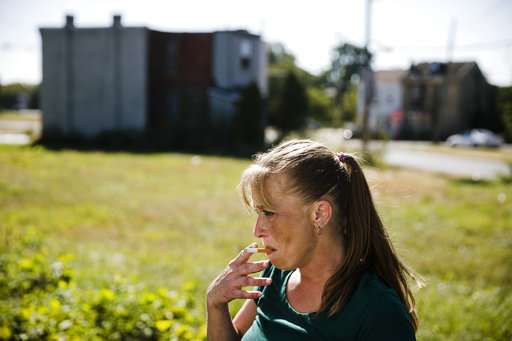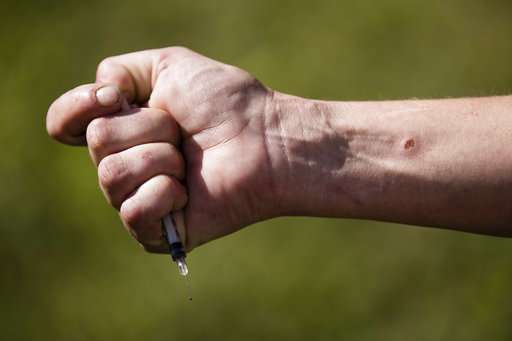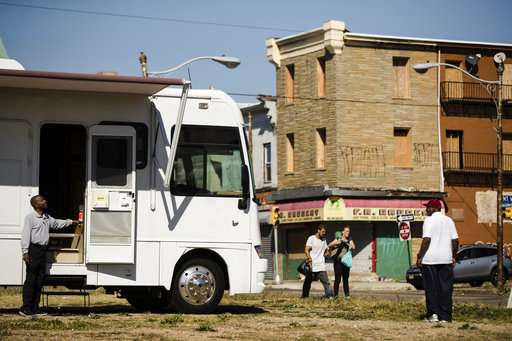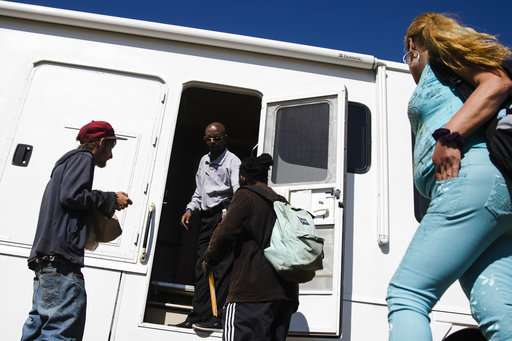In a city ravaged by heroin, a needle exchange stalls

As she pressed down on the plunger of an empty syringe, a drop of blood oozed from the crooked tip of its needle—a test, Denise Brown said, that she uses on unpackaged syringes she now buys on the street.
She got in the routine after a program that allowed people who use heroin to get sterile injection equipment was shuttered more than a year ago.
The closure of the needle exchange in Camden, a struggling New Jersey city across the Delaware River from Philadelphia, and a place where drugs are dealt openly on streets lined with abandoned storefronts and homes, has left many people there without a resource intended to stop the spread of blood-borne illnesses.
"They say they're doing this to keep us safe, keep us clean. Then they take it away," Brown, 41, said of the exchange program that she frequented for years during her nearly two decades of heroin addiction. "What does that say?"
And even with President Donald Trump declaring a public health emergency amid the national opioid crisis and Republican Gov. Chris Christie making addiction services a priority in his final year in office, the ending of the Camden program makes clear the tenuous position in which some of these services operate.
The city of about 74,000 needs to approve a permanent location for the health services van that once distributed the needles, but that decision has been held up in the office of outgoing Democratic Mayor Dana Redd, according to Martha Chavis, executive director of the Camden Area Health Education Center, which operated the program.

"I don't get it," said Chavis, noting positive dealings with the city from when the exchange started about a decade ago until private development forced them to shut down, although the van is still used to provide HIV tests, water and condoms.
"I'm just trying to get an answer," Chavis said, calling Redd's office the "roadblock" to why the program hasn't given out a syringe since August 2016 and recently had to forfeit nearly $93,000 in state grant funding.
She said her team began trying to find a replacement location in 2015 after announcements that a campus for the energy company Holtec International would be built along the Delaware River in Camden. Holtec official Ed Mayer said it was unsafe to have the van on the property.
Vincent F. Basara, a spokesman for Redd, said officials haven't agreed on a new place "that does not negatively impact our Camden residents or the quality of life in the surrounding area."
For people who used to get sterile syringes from Chavis' organization, it doesn't make sense that a city with so many vacant properties and fatal heroin overdoses—health officials linked 115 deaths in Camden County to heroin in 2015, the highest in the state—is struggling to find a permanent space for the program.

"Put your child in our place," said Joanna Greene, 31, who said she starting using heroin in 2008. "We're sick. So who cares if we get sicker? Because you don't even have a legitimate reason on why you took the needle exchange away."
Nationally, the programs can be hampered by neighborhood pushback, shoestring budgets or bureaucratic hurdles, advocates said, but statistics show they are becoming more prevalent.
According to AmfAR, The Foundation for AIDS Research, there are 263 syringe programs in 37 states, Puerto Rico and Washington, D.C., roughly 60 more than in 2012.
Congress approved the use of federal funds toward the programs in 2015 but stipulated that the money can't go toward buying syringes.
Twenty-six states, including New Jersey, and six select counties have been identified as experiencing or being at risk of significant increases in hepatitis infection or an HIV outbreak because of injection drug use after consulting with the Centers for Disease Control and Prevention, a necessary step in using federal money for syringe programs.

The programs have been shown to decrease needle sharing. The CDC said in a report released last year that only about 1 in 10 people who used exchanges shared syringes, compared with more than 40 percent who didn't use the programs. But it's difficult to link them directly to decreased rates of blood-borne illnesses because data aren't typically collected in controlled clinical trials.
In New Jersey, Christie has committed about $200 million to programs aimed at addiction prevention in his final year in office, including $2.1 million for syringe access programs in the state.
Christie has also signed legislation that would allow any municipality to operate a syringe access program and has approved a law authorizing syringe sales in pharmacies without prescriptions.
In Camden, Brown, with splotchy scars on her neck from injections with dulled needles, wondered why officials would allow such a long time to pass without allowing the exchange to operate.
"When people are desperate, they'll pick needles up off the ground," she said, her shaky hands lighting a cigarette. "They're worried about AIDS and hepatitis C. This is one easy way to keep it down."
© 2017 The Associated Press. All rights reserved.



















